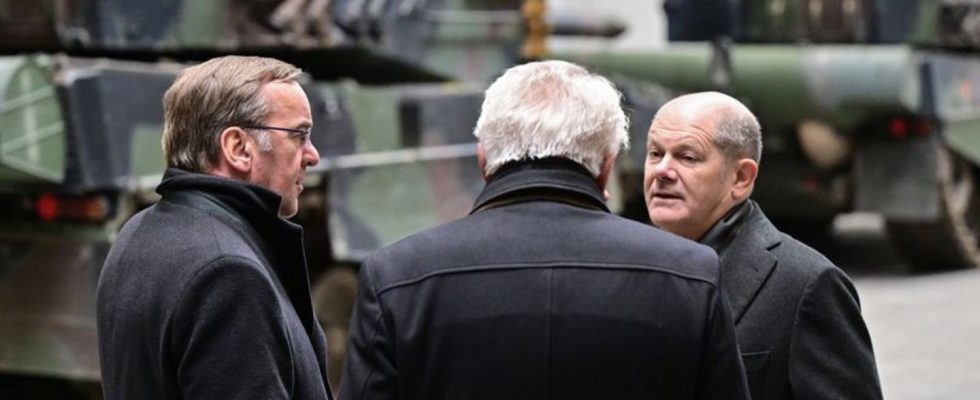Armaments company
Rheinmetall is building a new ammunition factory in Lower Saxony
Chancellor Olaf Scholz (r.), Defense Minister Boris Pistorius (l.) and Rheinmetall boss Armin Papperger. photo
© Philipp Schulze/dpa
Ammunition is currently in short supply, both in the Bundeswehr and for supporting Ukraine. The arms company Rheinmetall wants to change that and is building a new factory in the Lüneburg Heath.
Germany and its allies need more ammunition for their own troops and the support of Ukraine – the arms company Rheinmetall therefore wants to significantly expand its production. A new factory for artillery ammunition is to be built at the existing location in Unterlüß (Celle district) in the Lüneburg Heath.
Federal Chancellor Olaf Scholz, together with Defense Minister Boris Pistorius (both SPD), company boss Armin Papperger and Danish Prime Minister Mette Frederiksen, held the symbolic groundbreaking ceremony for the plant, which is to be completed in just twelve months of construction. The defense company announced that production should start next year.
“With this investment, you are laying the foundation for independently and, above all, permanently supplying the Bundeswehr and our partners in Europe with artillery ammunition,” said Scholz in the direction of the arms company. This is particularly important with a view to Ukraine and its ammunition needs. “So far we have made do by delivering a lot of what we had,” explained the Chancellor. But this is becoming less and less possible. “It is important that we do everything we can to increase production worldwide.” Rheinmetall’s new plant is an important signal here.
Scholz calls for large-scale production of armaments
“For far too long, armaments policy in Germany has been pursued as if it were about buying a car,” complained Scholz. “But that’s not how arms production works! If nothing is ordered for years, then nothing will be produced.” This makes it all the more important to increase production quickly now. “We have to move away from manufacturing – towards large-scale production of armaments,” said Scholz. “This is the only way to plan and procure sustainably. This is the only way we can achieve our goal of making the Bundeswehr one of the most capable conventional armed forces in Europe again.”
Company boss Papperger explained that with the new plant, Rheinmetall wanted to help the Bundeswehr fill the empty warehouses when purchasing ammunition and become independent of deliveries from abroad. “We do this out of the responsibility and the will to make a significant contribution to the defense capability of our country and our NATO partners with our technologies,” he said. “This is of strategic importance not only for Rheinmetall, but also for the Federal Republic of Germany and Europe.” Ukraine’s enormous consumption of ammunition is making the situation even worse. And this is not just a German problem, added Denmark’s Prime Minister, who joined the meeting at short notice. “The war in Ukraine concerns us all.”
200,000 shells per year planned
In 2025, 50,000 artillery shells are expected to leave the new “Lower Saxony plant”, followed by 100,000 in 2026 and later 200,000 per year. It primarily produces 155-millimeter artillery shells, as well as explosives and components for rocket artillery. The group wants to invest 300 million euros in the new factory and 500 jobs will be created.
The investment is part of Rheinmetall’s plan to significantly increase ammunition production. Before Russia’s attack on Ukraine almost two years ago, the arms company only produced a total of 70,000 artillery shells per year in Germany, Spain, South Africa and Australia, a spokesman said. There are now 400,000, and next year it should be 700,000.
Unterlüß is already the arms company’s largest production site; in addition to ammunition, military vehicles such as the Puma infantry fighting vehicle are also manufactured here. Rheinmetall currently has 2,500 employees at the site. Artillery ammunition is also already being manufactured here, but on a much smaller scale of 30,000 to 40,000 shells per year and only as a final assembly from delivered parts.
The federal government guarantees acceptance
A company spokesman said there was already an acceptance guarantee from the federal government for the new plant, which is expected to deliver five to six times as many grenades. “Otherwise no one would make such an investment.” Rheinmetall bears the construction costs alone. In his speech, Scholz referred to his commitment to spend two percent of gross domestic product on defense. “The Bundeswehr and industry can rely on this promise.”

